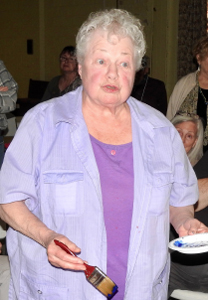 At
our May meeting, we featured local watercolor artist and teacher,
Flo Smith. Watercolor became her second career after
raising a family. She studied under artist, Barney Cole.
Now, she teaches a weekly watercolor class at the Mayfield Village
Civic Center to over 30 students! Several of her students are
also members of Euclid Art. She presented a unique watercolor
technique in the style of Nita Engle, an award winning artist born
in 1926 in Michigan (more about Nita later). This technique
reminded us of a ‘watercolor version’ of poured acrylics...remember
our September 2017 meeting, where Suzette Cohen demonstrated poured
acrylics? The spontaneity of this approach produces a glowing
sky and an overall wash as the backdrop for the painting.
At
our May meeting, we featured local watercolor artist and teacher,
Flo Smith. Watercolor became her second career after
raising a family. She studied under artist, Barney Cole.
Now, she teaches a weekly watercolor class at the Mayfield Village
Civic Center to over 30 students! Several of her students are
also members of Euclid Art. She presented a unique watercolor
technique in the style of Nita Engle, an award winning artist born
in 1926 in Michigan (more about Nita later). This technique
reminded us of a ‘watercolor version’ of poured acrylics...remember
our September 2017 meeting, where Suzette Cohen demonstrated poured
acrylics? The spontaneity of this approach produces a glowing
sky and an overall wash as the backdrop for the painting.
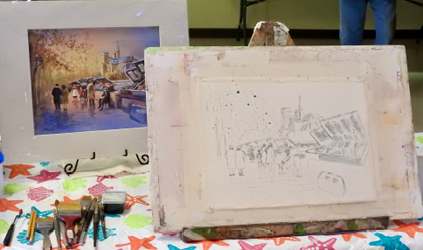 Flo
previously prepared her watercolor paper (140 lb cold press smooth
paper) by sketching an image borrowed from Edouard Cortes and using
a gray Pebeco masking agent (it’s like frisket) to protect the
whites in the painting. Flo said, “The lighting in Edouard
Cortes images lends itself nicely to the Nita Engle technique.”
Then, she stapled the paper to a board and taped the edges securely.
The 45 members and guest in attendance gathered around Flo to watch
her demonstrate the key step in this technique. She called
this part, ‘pizza flipping’. “Have your paints ready and
activated (misted with water)”, she said. She used only three
colors - French Ultramarine Blue (Winsor Newton), Winsor Red, and
Winsor Yellow or her favorite, Daniel Smith’s Quinophthalone Yellow.
Flo
previously prepared her watercolor paper (140 lb cold press smooth
paper) by sketching an image borrowed from Edouard Cortes and using
a gray Pebeco masking agent (it’s like frisket) to protect the
whites in the painting. Flo said, “The lighting in Edouard
Cortes images lends itself nicely to the Nita Engle technique.”
Then, she stapled the paper to a board and taped the edges securely.
The 45 members and guest in attendance gathered around Flo to watch
her demonstrate the key step in this technique. She called
this part, ‘pizza flipping’. “Have your paints ready and
activated (misted with water)”, she said. She used only three
colors - French Ultramarine Blue (Winsor Newton), Winsor Red, and
Winsor Yellow or her favorite, Daniel Smith’s Quinophthalone Yellow.
Now, she was ready to wet the paper. Really wet the paper,
“until it raises up like a muffin or yeast dough”, she said.
Tip - hold the paper up to the light and make sure to see a wet
glisten all over the paper; brush off excess puddles of water.
After determining where the light should be, Flo started with yellow
paint, then added red (touching into the yellow), followed by the
blue (touching into the red for purple), working very quickly.
Next, came the fun part...the ‘pizza’ flipping and spraying began.
With a spray bottle in one hand and the board in her other, she
sprayed on the outside of each edge (not on the paint), then she
turned and sprayed, turned and sprayed again, going around again
until she liked what she saw. The water and paint blended on
the paper. Flo laid the board flat and dabbed off the excess
water around the taped edge. At this point, she said to let it
air dry up to 24 hours before adding more paint and details.
She had a previously prepared dry image to work on for the rest of
her demonstration.
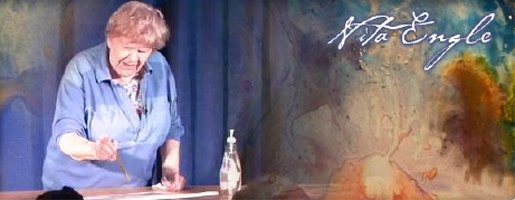
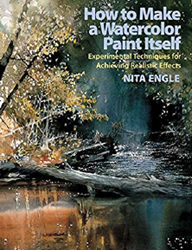 While
our president, Lee Peters, set up his projection system for us to
view the rest of Flo’s demo, we asked how she discovered Nita Engle.
She saw Nita’s artwork in a magazine and then bought her book, “How
to Make a Watercolor Paint Itself” (highly recommended).
Back in the day (before cell phones), Flo and her husband, Tom,
being avid fishermen, would travel in their RV to the Upper
Peninsula of Michigan, which is where Nita lived at that time.
Flo looked up Nita’s number in a ‘phone book’ and stopped along the
road at a ‘call box’ and called her. They talked for over 20
minutes and as a new painter, Flo was thrilled to talk to such an
accomplished artist.
While
our president, Lee Peters, set up his projection system for us to
view the rest of Flo’s demo, we asked how she discovered Nita Engle.
She saw Nita’s artwork in a magazine and then bought her book, “How
to Make a Watercolor Paint Itself” (highly recommended).
Back in the day (before cell phones), Flo and her husband, Tom,
being avid fishermen, would travel in their RV to the Upper
Peninsula of Michigan, which is where Nita lived at that time.
Flo looked up Nita’s number in a ‘phone book’ and stopped along the
road at a ‘call box’ and called her. They talked for over 20
minutes and as a new painter, Flo was thrilled to talk to such an
accomplished artist.
Watching Flo work on the details in the
painting was as interesting as watching the first part....adding
random dots of water and paint for distant foliage; mixing her own
black (French Ultramarine Blue and Burnt Sienna) for the figures;
removing the frisket and adding, to quote Flo, “the jewels of the
painting” (a color not used anywhere else, like Winsor Green
BlueShade). It was amazing to see what she accomplished in
just over an hour and a half! Thank you Flo, for this very
interesting demonstration.
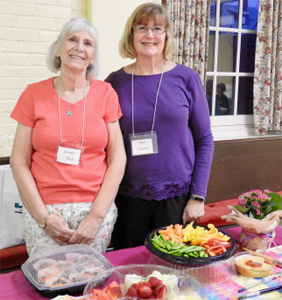 |
We also thank our
hosts for the evening, Jennifer Theil and Barb Everett for the
delicious table of treats....from fresh fruits and veggies,
cheese and crackers, mini pepperoni pockets, cherry pastry and
hummus, to a curiously delicious habanero pineapple sauce over
cream cheese. |
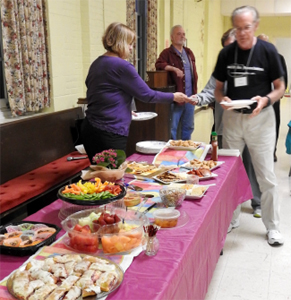 |